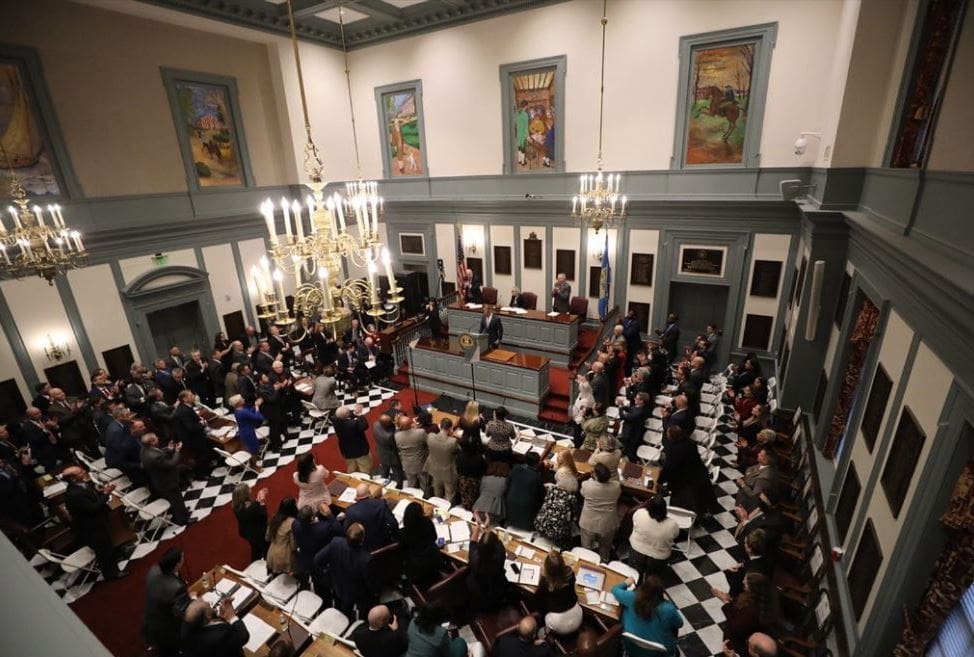

Gov. John Carney delivers the 2023 State of the State address. File photo.
Gov. John Carney’s last State of the State speech, meant to be a review of his administration’s achievements and a push for the state to tackle thorny issues, was interrupted four times by hecklers who seemed to be referencing the Israeli invasion of Gaza.
The first heckler started shortly into the speech and was removed, and a few minutes later another one started up before being removed. Toward the end of the speech, two others began.
As Speaker of the House Valerie Longhurst, D-Bear, repeatedly hammered her gavel against the desk and point out that the governor was in the house, and the sound on the live stream was reduced so it was hard to hear what the hecklers said.
When he was able to speak unimpeded, Carney pleaded with the General Assembly to think ahead and pass a bill that would block uncontrolled government spending.
“It’s really pretty simple,” he said. “Delaware can’t compete in the future if we don’t have our budget in order.”
A future governor or legislature could head down a path of uncontrolled spending, which would lead to higher taxes and painful cuts, he said.
He started office with a $400 million deficit and is expected to leave office with $400 million in reserves.
“Let’s not go backwards,” Carney said. “Instead, let’s build on the progress we’ve made. This year, I’m asking you to send me legislation that would make our spending benchmark
permanent.”
That benchmark is a formula that looks at proposed revenues and sets a limit to spending, with some money left in surplus.
“This year, I’m asking you to send me legislation that would make our spending benchmark permanent,” he said. “I won’t be here next year. I know some of you are happy about that. But most of you will. Don’t set yourselves up for failure.”
Carney also warned that the state cannot afford to ignore the escalating cost of health care.
“This year, between Medicaid and our insurance plan for state employees and retirees, we’re spending nearly $2 billion on health care alone,” he said. “Let me say that again: $2 BILLION– with a B. That’s roughly $200 million more than our costs last year. The state’s share of Medicaid alone costs $1 billion.”
Carney’s speech originally was scheduled for January, but postponed after he fell ill.
As usual, he was welcomed into Legislative Hall with a rousing round of applause.
Starting State with female power
Carney started his speech by noting that for the first time, a female Speaker of the House is presiding over the State of the State address.
Longhurst was elected speaker last June after Rep. Pete Schwartzkopf, D-Rehoboth Beach, stepped down to spend more time with family.
Also for the first time, the House leadership is all women: Majority Leader Melissa Minor-Brown, D-New Castle, Majority Whip Kerri Evelyn Harris, D-Dover/Magnolia, and Joint Finance Chief Kim Williams, D-D-Marshallton.
He also thanked his wife, Tracey, saying she “has transformed the role of the First Lady, we like to call her the First Spouse – and made sure every Delaware child has a First Chance to succeed.”
Carney said it was hard to believe this is his last State of the State address as governor.
Among the things accomplished during his two terms, he said, were the creation of 30,000 new jobs; dedicated school funding for low-income students and English learners; raising the salary of teachers; the largest infrastructure plan in state, which also meant more jobs; turning a $400 million budget deficit in 2017 to $400 million in reserves; an economic resurgence in downtown Wilmington; providing paid leave for Delaware families; raising minimum wage to $15 an hour; and reducing both crime and the prison population.
He said the state has passed sweeping climate change legislation and committing to net zero emissions by
2050 and also banned assault weapons and launched targeted gun safety measures.
“These are issues that matter to Delaware families in each of your districts,” he said.
Good jobs. Quality schools. Safe and affordable communities. A cleaner environment. Responsible management of taxpayer dollars.
He said he was proud of the $1.5 billion that’s been spent on school construction, especially the first new school in the city of Wilmington in 50 years: the Maurice Pritchett Sr. Academy, expected to open in the fall.
“Students, teachers and neighbors on the East Side will have a state-of-the-art school building they can take pride in,” he said.
Everything that’s been done, he said, “simply isn’t enough.”
Coming up at 3 p.m.: GOP responds to Carney’s State of the State
Carney pointed out that less than 40 percent of Delaware children are reading proficiently at third grade, and many schools fall short of that average.
“We need to fix it,” he said. “That’s why my budget includes funding for a new team of literacy coaches. They will work with educators and district leaders to focus on the science of reading – an effective approach to teaching children how to read.”
His budget also continues to focus on early childhood education and childcare so kids can start learning earlier.
Carney talked about creating the Delaware Prosperity Project as well as the Strategic Fund, Site Readiness, in Graduation Lab Space, and our Transportation
Infrastructure Investment Fund to attract companies with jobs.
“We will not lose the competition with other states for good jobs,” he said. “We also have our eye on the future of Delaware’s economy.”
He pointed to federal research projects, NIIMBL and SABRE, at the STAR campus at the University of Delaware.
Both will help build Delaware’s strong foundation in science and technology and attract more high-quality workers to Delaware and spur innovation and business
development, he said. this.
He also pointed to the hydrogen hub that will be shared by Delaware, Pennsylvania and New Jersey. It’s expected to bring $750 million to the region.
“Make no mistake: This is a generational opportunity to build a clean energy industry right here in Delaware. And to compete for good union jobs of the future,” he said.
Keeping good jobs and workers means making sure families feel safe, he said.
Under his watch, the state has banned assault weapons, bump stocks and high-capacity magazines, as well as passing red flag laws and preventing straw purchases.
“This year, we’ll take another big step forward and pass the permit to purchase law,” he said.
The administration also has worked on Group Violence Intervention, first in Wilmington and now in Dover.
“Here’s the truth: it’s a very small number of people who are committing the vast majority of gun violence in these communities,” he said. More than 300 people have participated, he said.
The state is engaging directly with them, he said, demanding they put down their guns in exchange for job training and other social services.
Those who refuse are threatened with prosecution to the fullest extent of the law, he said.
“And Attorney General Jennings has been doing that,” he said.
The administration also has been working to prevent gun violence in western Sussex County, he said, citing the support of Tim Dukes, R-Laurel and Danny Short, R-Seaford, and Sen. Bryant Richardson, R-Laurel, he said.
Among the ways that the state is tackling climate change and trying to make sure the state has access to renewable energy is starting negotiations with offshore wind developer US Wind and taking a more active leadership role in offshore wind development.
The deal is expected to bring more than $100 million in benefits to our state without raising rates, he said.
“It’s been a great honor for me to serve as your governor,” he said. “I believe the opportunity to serve as an elected official is the greatest privilege that a people can bestow on one of their own.”
The audience rose to its feet to applaud at that point, and Carney thanked them.
“There’s a lot of love in that standing ovation,” Carney said, and thanked Schwartzkopf for leading it.
The last seven years haven’t always been easy, Carney said. The three years of the COVID pandemic felt more like 10, he said.
“I’ve learned that the most important thing for an elected official is to earn the trust of the people you represent,” he said. “They will give you the benefit of the doubt – so long as they trust you’re always trying to do the right thing. If you earn that trust, they will follow you when times are tough.”
He got choked up while thanking his wife again, and their sons Sam and Jimmy, for their support.
“I couldn’t have done it without them,” he said.


Betsy Price is a Wilmington freelance writer who has 40 years of experience.
Share this Post








